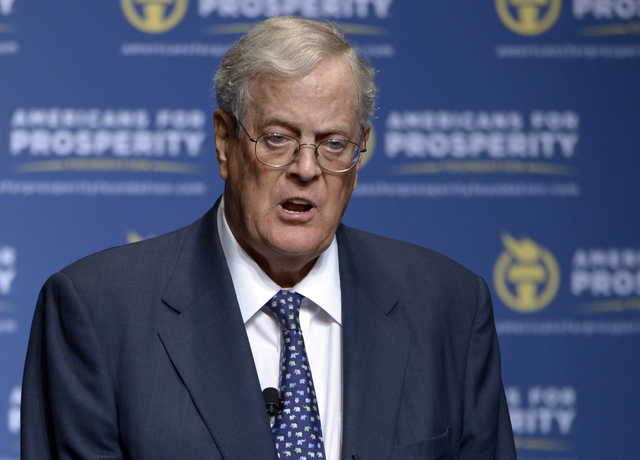NEW YORK — Billionaire industrialist David H. Koch, who with his older brother Charles poured a fortune into right-wing causes, transforming the American political landscape and shaping U.S. policies on such issues as climate change and government regulation, died Friday at 79.
The cause of death was not disclosed, but Koch Industries said Koch, who lived in New York City, had contended for years with various illnesses, including prostate cancer.
A chemical engineer by training, Koch was an executive in the family-run conglomerate, the Libertarian Party’s vice-presidential candidate in 1980 and a major benefactor of educational, medical and cultural organizations.
But he and his brother became best known for building a political network dubbed the “Kochtopus” for its many-tentacled support of conservative and libertarian causes, candidates and think tanks, including the Cato Institute.
The brothers in 2004 founded the anti-tax, small-government group Americans for Prosperity, which remains one of the most powerful conservative organizations in U.S. politics, and they were an important influence on the tea party movement.
While celebrated on the right, the Koch brothers have been vilified by Democrats and others who see them as a dark and conspiratorial force, the embodiment of fat-cat capitalism and the corrupting influence of corporate money in American politics.
“I was taught from a young age that involvement in the public discourse is a civic duty,” David Koch wrote in a 2012 op-ed in the New York Post. “Each of us has a right — indeed, a responsibility, at times — to make his or her views known to the larger community in order to better form it as a whole. While we may not always get what we want, the exchange of ideas betters the nation in the process.”
Some prominent Republicans praised his legacy upon his death, with libertarian-leaning Sen. Rand Paul of Kentucky saying “his many contributions will have lasting impact on our country.”
On the other side of the political divide over Koch, Beth Rotman of the government watchdog group Common Cause said the Kochs and their network of like-minded wealthy donors “undermined so many important American values over the past several decades as part of the Kochs’ attempted corporate takeover of American politics.”
Among other things, the Kochs and their company bankrolled a decades-long movement to cast doubt on man-made climate change and to thwart efforts to fight global warming through reducing greenhouse gas emissions.
David Koch had stepped away from a leadership role in recent years because of declining health, including a decades-long battle with prostate cancer, and his brother became the network’s public face. In an interview after the 2012 Republican convention, his mind was on his legacy.
“When I pass on,” he told The Weekly Standard, “I want people to say he did a lot of good things, he made a real difference, he saved a lot of lives in cancer research.”
Koch donated $100 million in 2007 to create a cancer research institute at the Massachusetts Institute of Technology. He also gave millions to Johns Hopkins University in Baltimore, the Memorial Sloan-Kettering Cancer Center in New York, the M.D. Anderson Cancer in Houston and other institutions.



